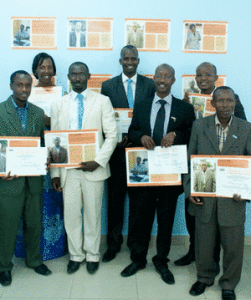A key ruling by the Swiss Federal Criminal Court has given momentum to a war crimes case against the Swiss gold refining giant, Argor-Heraeus SA, alleged to have laundered millions of dollars of looted gold from the Democratic Republic of the Congo.
The three NGOs behind the Stop Pillage Campaign, the Conflict Awareness Project, Open Society Justice Initiative, and TRIAL, call on the UK and Jersey Channel Island authorities to follow suit and swiftly investigate the two British firms which were the primary traders of the gold at issue in the case.
To date, the London-based Hussar Services Limited and the Jersey Channel Island-based Hussar Limited, as well as their corporate directors, have evaded accountability for their central role in the lucrative transnational “blood gold” enterprise alleged in the complaint in Switzerland.
The Swiss court ruling from 24 January 2014 upheld the right of the prosecutor to search the premises of Argor-Heraeus SA and seize documents and computers. Stating that the strength of the evidence warranted such an action, the court rejected Argor’s subsequent legal challenge to the prosecutor’s right to conduct the search.
“This decision corroborates what we have always believed: that very serious suspicions weigh on Argor-Heraeus SA. This decision will now allow the authorities to continue the investigation, the results of which we will await with great interest,” said Bénédict De Moerloose, lawyer in charge of the case at TRIAL.
“Until governments such as the UK and Jersey Channel Islands start to hold their own firms and businesspersons criminally liable for the pillage of Congo’s natural resources, war profiteers who aid and abet atrocities and human suffering will continue with impunity,” said Kathi Lynn Austin, Executive Director of the Conflict Awareness Project.
The same evidence that prompted the Swiss Prosecutor in charge of war crimes to open a criminal investigation against Argor-Heraeus SA has been made available to the UK and Jersey Channel Island authorities. Kathi Lynn Austin of the Conflict Awareness Project conducted the investigation over a nine-year period while the Open Society Justice Initiative provided the blueprint for reviving the prosecution of pillage.
“We are heartened by the seriousness with which the Swiss authorities are pursuing the case as exemplified by this recent court ruling. We urge UK and Jersey Channel Island law enforcement authorities also to pursue their investigation into the matter as rapidly as possible and, if warranted, prosecute those they conclude to be guilty of these war crimes,” said Ken Hurwitz of the Open Society Justice Initiative.
The Swiss court ruling from 24 January 2014 upheld the right of the prosecutor to search the premises of Argor-Heraeus SA and seize documents and computers -which the federal police did on 4 November 2013.
Stating that the strength of the evidence warranted such an action, the court rejected Argor’s subsequent legal challenge to the prosecutor’s right to conduct the search.
“The decision of the Swiss Federal Criminal Court corroborates what we have always believed: that very serious suspicions weigh on Argor-Heraeus SA. This decision will now allow the authorities to continue the investigation, the results of which we will await with great interest,” said Bénédict De Moerloose, lawyer in charge of the case at TRIAL.
The Swiss case is a milestone for international justice: for the first time since the immediate aftermath of WWII a corporation could be judged for complicity in the war crime of pillage.
For more information:
- Stop Pillage Campaign website
- About the Swiss legal complaint filed by TRIAL
- CAP’s report on the Pillage of Congo Gold: A Case for the Prosecution of Corporate Crimes
- OSJI’s publication on Corporate War Crimes: Prosecuting the Pillage of Natural Resources

 Sarita Sharma was arbitrarily arrested on 20 October 2003, in Kathmandu by soldiers of the Royal Nepal Army. Sarita Sharma was brought to the infamous Maharajgunj barracks, headquarter of the Bhairabnath Battalion, where she was forcibly disappeared for 10 months and held in arbitrary detention for 10 more.
Sarita Sharma was arbitrarily arrested on 20 October 2003, in Kathmandu by soldiers of the Royal Nepal Army. Sarita Sharma was brought to the infamous Maharajgunj barracks, headquarter of the Bhairabnath Battalion, where she was forcibly disappeared for 10 months and held in arbitrary detention for 10 more.